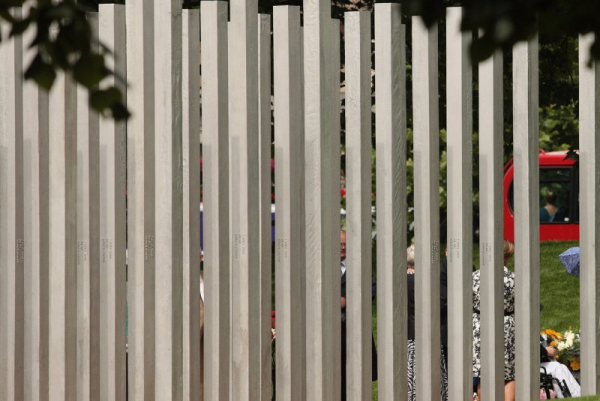

1 of 3 | British Prime Minister Keir Starmer, London Mayor Sadiq Khan and representatives of the emergency services joined families and survivors at a ceremony Monday morning for the victims of 7/7 in Hyde Park, where there is a memorial to the victims. File photo by Hugo Philpott/UPI | License Photo
Britain on Monday marked the 20th anniversary of the 7/7 attacks on London’s transit system by Islamic extremists that killed 52 people and injured more than 700 with commemorative events across the capital.
A minute’s silence was held at 8:49 a.m. local time, the moment when three suicide bombers detonated devices inside London Underground trains at Aldgate, Edgware Road and Russell Square on July 7, 2005. A fourth device detonated around an hour later on the upper level of a double-decker London bus.
Prime Minister Keir Starmer, London Mayor Sadiq Khan, local politicians and the commissioners of London’s three police forces and ambulance and fire services laid wreaths at a memorial to the victims in Hyde Park while members of the public placed flowers at the entrances to tube stations.
“Today the whole country will unite to remember the lives lost in the 7/7 attacks, and all those whose lives were changed forever. We honor the courage shown that day — the bravery of the emergency services, the strength of survivors, and the unity of Londoners in the face of terror,” Starmer said in a statement posted on X.
“Those who tried to divide us failed. We stood together then, and we stand together now — against hate and for the values that define us of freedom, democracy and the rule of law.”
The minute’s silence was also observed in Tavistock Square, where representatives from London’s emergency services and medics and staff laid flowers outside the British Medical Association headquarters, where the No. 30 Transport for London bus was ripped apart in a massive blast that killed 13 passengers.
Among those paying tribute were doctors who ran out from the BMA building into the street that day to provide emergency medical assistance to the victims.
Later in the morning, a service of commemoration was held at Saint Paul’s Cathedral, presided over by the Bishop of London, Dame Sarah Mullally.
In a special message of unity published on his official website, King Charles III said he was thinking of and praying for “all those whose lives were changed on that terrible Summer’s day.”
“We remember with profound sadness the 52 innocent people who were killed in senseless acts of evil — and the enduring grief of their loved ones. We recall, too, the hundreds more who carry physical and psychological scars, and pray that their suffering may ease as the years pass.”
He also paid tribute to what he said were extraordinary acts of courage and compassion shown that day from emergency services and transport workers to ordinary people who all rushed towards danger to help strangers, calling it a reminder of the “best of humanity in the face of the very worst.”
“While the horrors will never be forgotten, we may take comfort from the way such events rally communities together in solidarity, solace and determination. It is this spirit of unity that has helped London, and our nation, to heal.”
The attacks prompted a wholesale overhaul of the country’s approach to the terror threat from extremists, but the security services warned the threat had evolved from organized plots by groups and individuals — often already on authorities’ radar — to “lone wolf” type plots, many of them by previously unknown suspects under the age of 18.
Then-Prime Minister Tony Blair said Britons were much better protected today than they were in 2005, but acknowledged the problem was much more challenging for the current administration.
“We’re a lot safer from terrorism because the security services have a very good system in place. But there will be a problem as long as the ideology exists,” he told the BBC.
The attacks were the first suicide bombings to be carried out in Britain, although the Irish Republican Army carried out a terror campaign of bombings and shootings on the mainland from the 1970s through the 1990s, they frequently gave advance warning in order to avoid mass casualties.
Other Islamist-inspired terror attacks followed, notably a suicide bombing at an Ariana Grande concert in Manchester and a vehicle ramming and stabbing rampage in Borough Market in London, days apart in 2017.